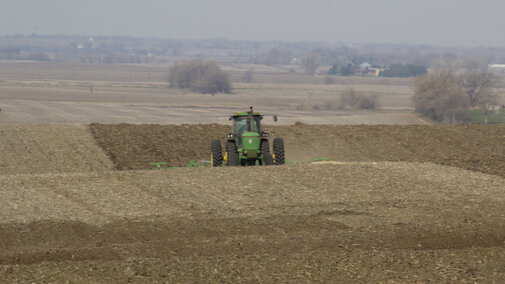(This article is part of Nebraska Extension's Strenghthening Nebraska's Agricultural Economy series.)
Parents co-signing loans for their children is common in agriculture. This usually happens when the child needs a loan to purchase land, livestock, or farm equipment. Lenders are more willing to make the loan to a beginning producer if the parents co-sign and promise to repay the loan if the younger producer cannot.
Parents have been doing this as a way to help their kids get started in agriculture for decades. If the child turns out to be an effective producer and manager, the risk of the parents being on the hook for the unpaid loan balance is pretty manageable.
Case Study — What to Avoid
Obtaining the loan guarantee from the younger producer's parents often ends up being a late step in the ultimate loan foreclosure process, as illustrated in a 1987 Nebraska Supreme Court case (226 Neb. 314).
In May 1983 the lender notified the son that it would need the father's guarantee of the son's operating loan to continue the loan. The amount owed was over $120,000 and the son's net worth was under $500.
The father signed the guarantee, and the lender continued the loan. Five months later – in November 1983 – the lender called the loan because the son couldn't pay. After the son's property had been sold, the father paid over $75,000 to cover the unpaid balance.
If the father hadn't co-signed, the lender probably would have started foreclosure in May, perhaps with some unpaid balance, and Dad would have kept his $75,000.
There is another situation, however, when parents may be asked to co-sign or guarantee payment of a child's debt when the younger producer can't repay a loan. This may be the case today for some Nebraska producers, given current low crop prices and thin operating margins. In this situation, lenders may ask the borrower to provide additional loan collateral, such as land, livestock, or equipment that is clear of debt. The request for a parent's loan guarantee is another common way to provide additional security for loan repayment.
Here are some points to consider before you sign a loan guarantee for a family member who is heavily in debt:
- Will the loan co-signing work? Get an outside financial analyst to give you an independent opinion regarding (a) what it would take to turn the operation around financially and (b) will the loan co-signing help in that process. If the answer to either question is no, see question 4.
- Cap the amount of the loan guarantee. You don't want an open-ended liability, so fix the maximum dollar amount for which you’ll be liable.
- Find out from the lender how much debt payback is needed this year for the lender to continue operating financing next year. If the family member has to pay everything off in one year, it isn't likely to happen unless you believe in miracles. (See question number 1.) You should retain your own attorney (not the lender’s attorney) to assist you in negotiating the loan co-signing agreement.
- Can you afford to lose all or most of the amount of the loan guarantee? (See question 2.) If you can't afford to lose the money (and sadly it is more likely than not that you will), you can't afford to sign the loan guarantee.
This is a very difficult situation. No one wants to be part of losing the family farm or ranch, but if the loan guarantee isn't part of a financial turnaround plan that has at least a fighting chance of success, don't sign the guarantee unless you absolutely don't need the money for your own retirement.
Note: This information is provided for educational purposes. It is not intended as legal advice.
This article was originally published in Nebraska Farmer.

